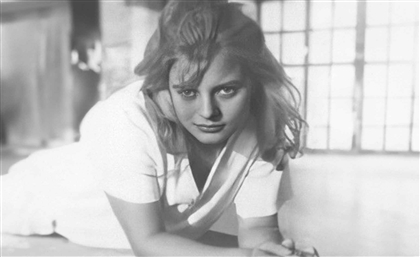That Time I Went Camping With Complete Strangers in the Sinai Desert
When I was invited on a three-day hiking trip in Sinai with strangers, I was more than a little hesitant. Yet, for some reason, I found myself packing for the desert.

One thing about me is—I could easily be persuaded into going to the sketchiest rave in town. A little risky, sure, but I’d be popping up to techno, at least. Though, willingly getting stranded in the middle of nowhere, surrounded by the type of deafening silence that allows your deepest thoughts to be heard and all the creepy, crawly creatures the Sinai desert has to offer? No, thank you.
So, when the Egypt Hiking Community (which is just as the name implies) invited me on a three-day hiking trip in Sinai, I was more than a little hesitant. And while my best friend came through with an enthusiastic “Oh, sounds fun!” when I broke the news, all I could think was—No, Susan. Sleeping and hiking in the mountains with a cohort of complete strangers does not sound like fun.
You see, I may look spontaneous at first glance (my Aquarius star sign is to blame), but in reality, I’m more of a giant squirrel, prone to hibernation and usually just want to lie aimlessly in the comfort of my beloved bed. Yet, for some unknown reason (work, stress, life), I found myself packing up my bags and prepping for the desert.
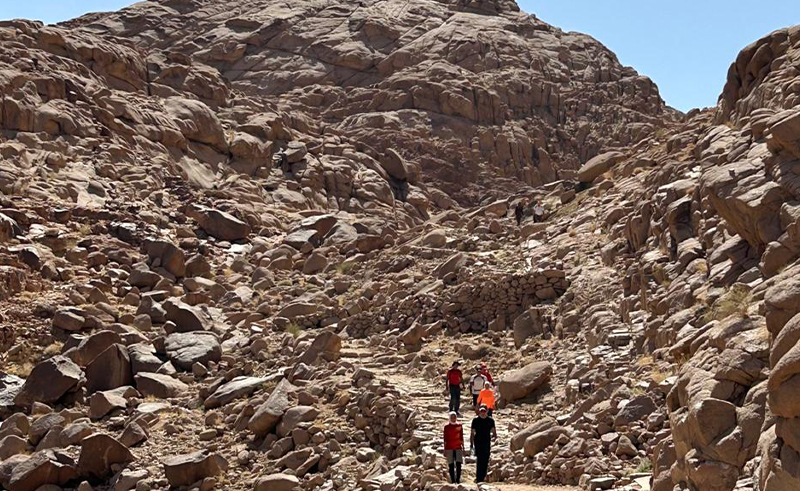
On the morning of our departure from Cairo to Catherine Town in southern Sinai, I woke up on the wrong side of the bed for very obvious reasons. Firstly, I was insanely overwhelmed by the exhaustive packing list Charif—the founder of the Egypt Hiking Community—had sent me the day prior. Secondly, and most importantly, the reality that I had never been on a hiking, much less camping, trip before in my 23 years of existence had begun to dawn on me.
With my stomach churning, I considered calling it off at the last minute and coaxing my mother into writing me an apology letter like she did when I was in middle school. My inexcusably (very) late arrival at the pickup point in Heliopolis, combined with the disarray I caused by getting lost in the vicinity of Baron Palace, can clearly attest to my unwillingness to go on this so-called “adventure”.
But the moment I stepped into the van, I was taken aback by the enthusiasm and the warm greetings I received from everyone in the group. I couldn’t help but think: What are they excited about? We’re about to sleep in the desert! In some weird way, the two people seated beside me, Oumaiyma and Bakr, seemed to sense my inner turmoil. They took pity on my poor state and started poking it gently with small talk.
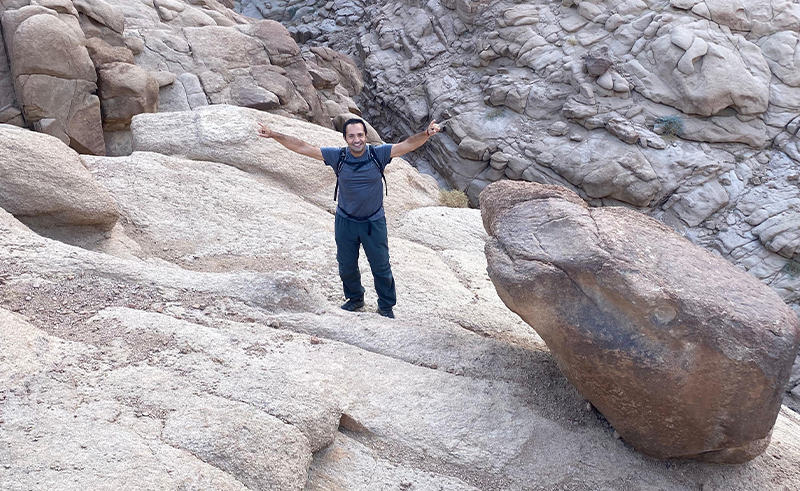
“This must be your first time,” Oumaiyma remarked and I nodded uneasily. ‘’You’ll enjoy it, trust me.”
“You just have to go in with good faith,” Bakr decided to chime in. “Don’t have expectations, so you can enjoy the journey.”
As I let their words soothe me and watched the sky, coloured in ethereal hues of pink and purple I had never seen in my life, the mounts of chronic stress that had piled up in knots on my lower back suddenly began dissolving.
Now, almost weeks after the trip ended, my somewhat philosophical conversation with Ashraf—a former naval officer in his early fifties, who has been a member of the Egypt Hiking Community for nearly four years—about the point of doing all of this to ourselves, comes to mind, as I try to resist the near-masochistic urge to plan another hiking trip with the community in the upcoming months.
“Everyone’s here with the same purpose—throw away whatever burdens they’ve been carrying in the city and act like an irresponsible child for just a little bit,” Ashraf had said, and I had rolled my eyes.
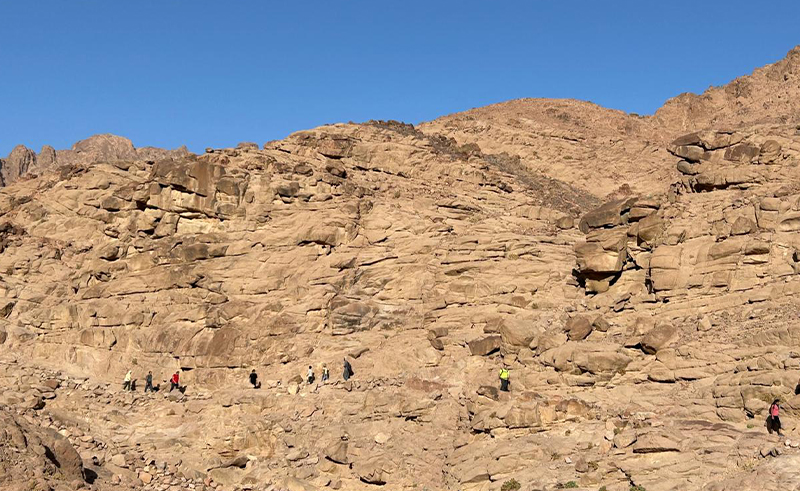
When I try to recall my drive to the campsite, it doesn’t seem too bad. It almost felt like a family road trip sans the brain-splitting drama. Not even thirty minutes into the drive, Eman, a 52-year-old culinary virtuoso, who I personally knighted ‘The Egypt Hiking Community’s Master Chef’, aggressively thrust a bag of homemade cookies my way.
‘’Is that like a complimentary welcoming drink or something?’’ I joked, observing the cookies she had spent the whole day before the trip baking herself. “It’s just Eman,” Charif replied.
Apparently, on each trip Eman goes on with the Egypt Hiking Community she always brings an assortment of homemade treats for everyone in the group. And this trip was no different. After we hit the highway, a tray of Keto-friendly pizza that she had also made herself was casually passed down the van’s aisle.
Afterwards, with too much time on our hands during the seven-hour ride, Charif began telling me the tale of how the community came to be.
Although he had been actively hiking since 2008, he had never thought of turning his hobby into a “business”, mainly thinking of it as a method to clear his head. However, after going on too many hikes where the majority of his companions were non-Egyptian, the 2011 revolution happened, “At that time, there weren’t any tourists coming to Egypt. So, the Bedouins I had been hiking with started telling me, ‘Bring your friends, bring more Egyptians’. So, that’s what I did.’’
What began as an informal excursion with a close circle of friends quickly took the shape of, well, a business. One that’s dedicated to “fostering connections between like-minded people” against the backdrop of some of Egypt’s most breathtaking landscapes, and with the Sinai Bedouin culture at the very centre, “There are so many places here many of us haven’t explored or seen yet.”
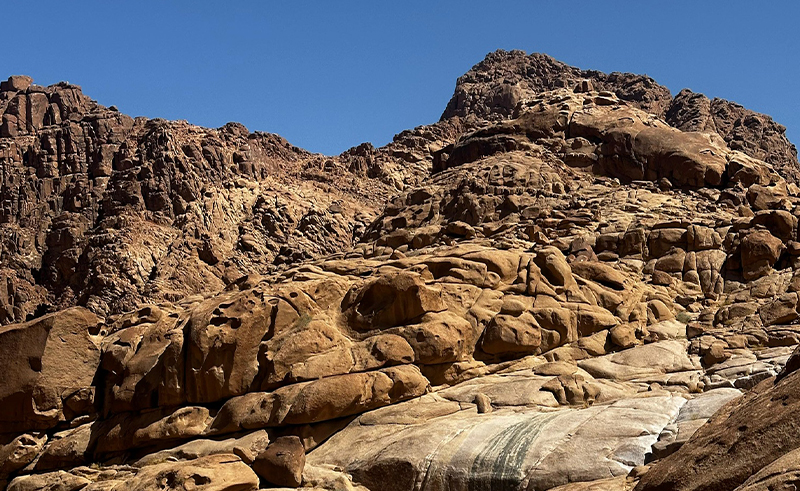
Finally, we arrived (at the crack of dawn, I might add) at our designated lodge in Catherine Town. It was on a campsite so far off the grid that, even though we only stayed that night, I called my mom whispering, ‘’I wanna go home’’. She thought I was joking, of course.
The next morning, after we had convened for a very traditional Egyptian breakfast consisting of shakshuka and baba ganoush, I facetimed my best friend before disconnecting from the digital world for like two days in a row (an eternity, I know).
“What am I doing here?’’ I almost wept.
“You always say you wanna experience things, but you don’t actually wanna experience things,’’ he replied, soberingly.
“But, there are no smoking areas!”
After a brief panic attack that I quickly brought under control, camels arrived to carry our luggage, while a van took us to the beginning of Wadi Telaah, our first hiking trail. It was around 10 AM when we started hiking, and though the sun was in our faces the whole time, it wasn’t as unbearable as Cairo’s summer weather. There was even a cool breeze that accompanied us for a while.
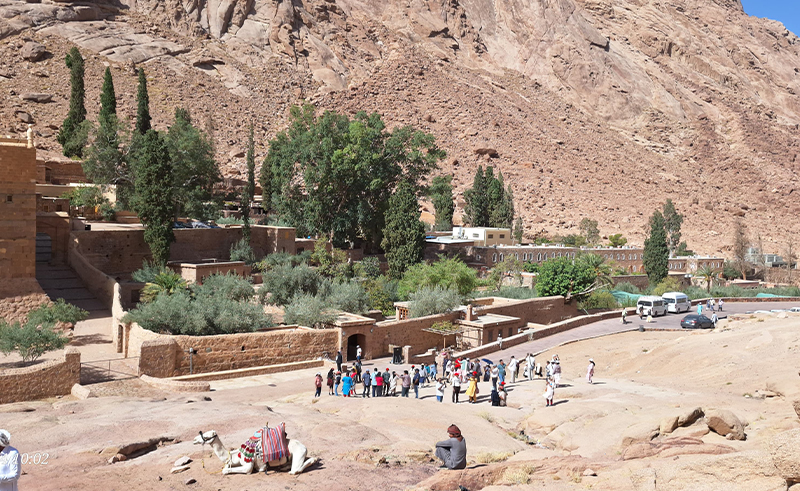
The moment we started walking, my anxiety was replaced with excitement, and I hit the trail running (metaphorically, of course). Being the competitive gal that I am, I started walking briskly, trying to catch up to everyone, which later bit me in the ass, because thirty minutes into the hike, I was gasping for air. Given that I had spent the past year stationed at a desk, with little to no exercise, my fitness levels were not just poor but non-existent.
“Go at your own pace, nobody is running after you,’’ Eman reprimanded me in a motherly manner. I realised I had been running less out of a general need to excel at everything and more out of fear of getting left behind in the middle of the desert with nothing but foxes or wolves or whatever to keep me company. But, throughout the hike, Charif and two Bedouins from the Gabalyia tribe expertly guided us through the mountains, with one of the two men always leading the group, while the other stood at the back, making sure no one was left behind.
“They always wait for you. So, no matter how slow you are, you’ll be fine,’’ Eman said.
Somehow, this filled me with a sense of comfort and safety, and I started to take in more of the surrounding scenery without stressing that much about my pace.
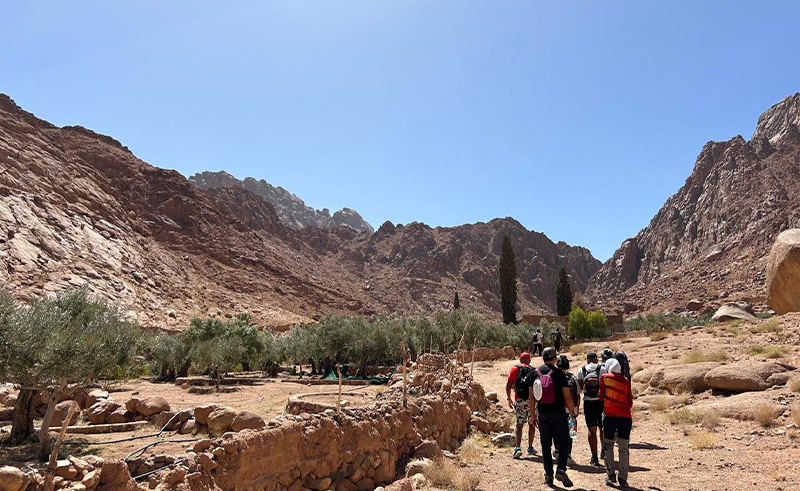
By noon, we had reached an area called The Waterfalls, where shoes were discarded and everyone started dipping their toes into the green waters (which Charif kept insisting was a natural spring that wouldn’t give us malaria) for a refreshing respite from all the strenuous trekking we had been doing for two hours.
At some point during our 10 minute break, Eman threw her backpack on the ground and took a nap, “That’s just Eman being Eman,’’ Ashraf chuckled.
“I can hear you, Doctor Ashraf,” Eman retorted playfully.
‘’You’re a doctor?’’ I asked, to which Charif replied, ‘’Doctor of the Sinai summits.’’
‘’Eman spread that rumour, just because I’m a former naval officer and I have a background in first aid emergencies. And, I always come with a bag of drugs,’’ Ashraf winked at the end and my eyes widened. Turns out the drugs in question were just medical necessities needed during a hike, like painkillers, muscle relaxants, sprays, and band-aids. Thank God.
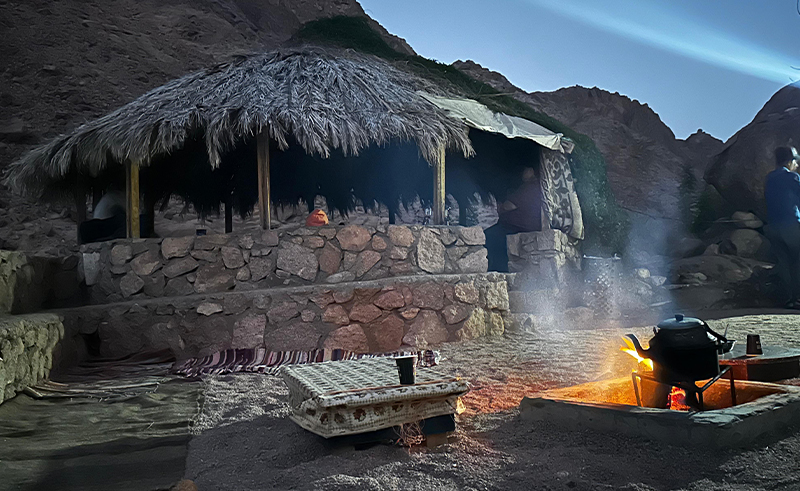
After our brief rest, during which Ashraf and I established our own ‘Hiking & Smoking’ community (because this is what a healthy, balanced and sustainable lifestyle looks like), we continued hiking through Wadi Telaah for a couple more hours until we reached Beit El Raheb, a monastery garden in mountains. There, we stopped to explore and drink some piping hot marmarya tea with the Bedouins, before ultimately reaching our destination—Ouda Camp.
A humble campsite in the heart of the southern Sinai mountains, Ouda Camp is where we would sleep with no electricity or network, in a very primitive cabin, and with a bathroom that had a broken plastic bottle as a shower head. No, I wasn’t freaking the fuck out, I was totally Ross-from-Friends fine and powering through with my Fresh Buzz.
Noting my very visible stress, Bakr approached me and said, “It has its own flavour, which, yes, might be different from what we’re normally used to, but it’s still nice and grounding in a way.”
His voice was really calming when he continued, “Think about it. Those people that live in the mountains—why do they do it? Because they want to focus on themselves and their feelings.’’
Around 4 PM at Oud Camp, we had our lunch: tuna salad, grapes that were freshly picked from a tree before they hit our tablia, and white cheese drizzled in organic olive oil, along with a molasses and tahini concoction, that was the star of the whole show and had everyone linking their fingers and scraping their plates clean.
After lunch, Bakr suggested we hike for another 10 kilometres (???), and Charif happily agreed.
That extra hike took thirty minutes to complete, during which we came across a carob tree from which Farag—our Bedouin guide—picked some for us to taste, and an Arabian tobacco farm, which we sadly couldn’t sample.
At some point during that short hike, I realised that Georg—a 40-year-old German Egyptian man who had joined us in Catherine Town before we started hiking—was walking barefoot the whole time.
“Are you a masochist?’’ I couldn’t help but ask him.
‘’It’s a nice grounding sensation,” he replied, “The stones start to feel like your shoes. It makes you more aware of where you are at that moment in time.’’
By the time we got back to the campsite, the sun had already started to go down, and our Bedouin companions were preparing our dinner—grilled chicken, rice and a vegetable soup.
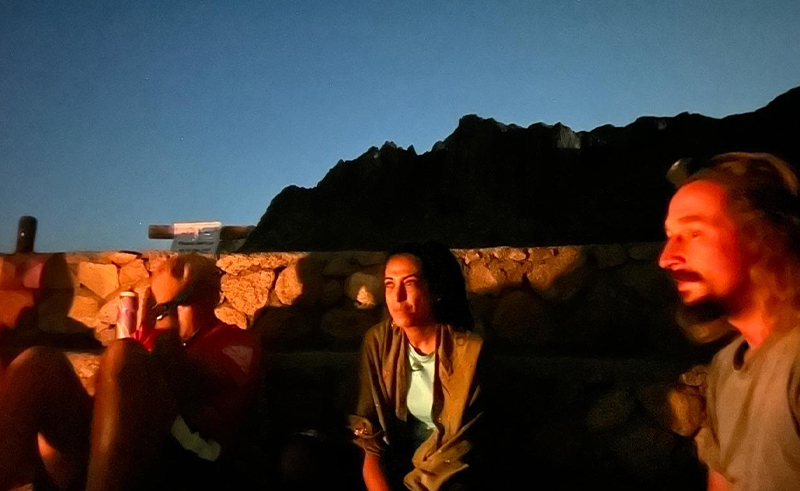
It was dark with only a small battery-powered lamp in the middle of the dinner tablia to light the space. We sat on stiff cushions on the ground, listening to music from Bakr’s playlist. The atmosphere felt eerie yet intimate and cosy, as Julio’s soft vocals and Bouceli’s soulful chorus ricocheted off the surrounding mountains. Right above our heads, the moon was taking centre stage amidst the dark starlit sky. For what seemed like a lifetime, we sat in a kind of comfortable silence that us city folk don’t get to experience with all the unnerving noise and chaos.
Just then, Eman, being the icon that she is, brought out trays of homemade basbousa, which she had been hiding since our arrival at the campsite.
“This is becoming a Hike & Eat, Eman,’’ Charif joked as she started handing everyone a generous piece on a handkerchief.
The air was filled with heartwarming good energy, bellyaching waves of laughter at ridiculous dad jokes from Charif, and a lot of Georg-watching, since he was so starstruck by the Bedouins who were baking farasheeh—a type of bread that’s very popular in southern Sinai.
The next morning, we gathered for a quick breakfast—an assortment of farasheeh, jam, white cheese with tomatoes and olive oil, foul and boiled eggs. Afterwards, we departed Ouda Camp to go on our second hike of the trip. We trekked a little bit further into Wadi Telaah, and up Abu Sila Hill before we finally descended. At the bottom, a van waited to whisk us away to Wadi El Raha in Catherine Town, where we visited St. Catherine’s Monastery, one of the oldest functioning monasteries in the world and situated on the slopes of Mount Sinai, where the prophet Moses allegedly received the Ten Commandment from God.
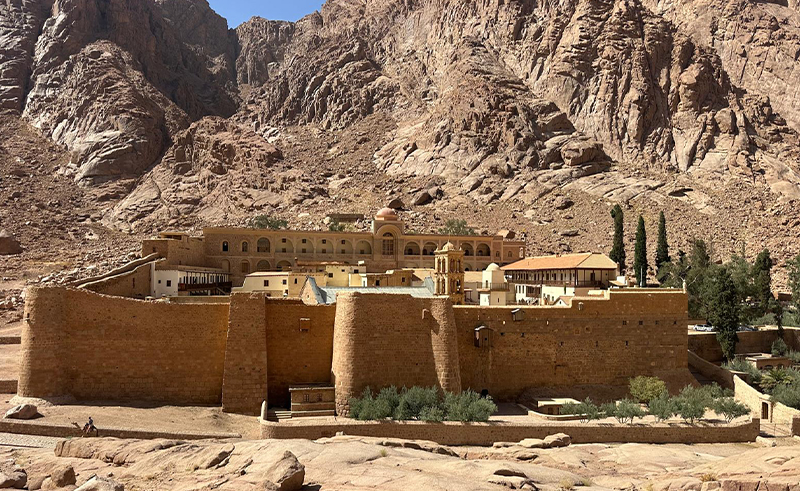
To get to the Greek Orthodox monastery, we walked for 15 minutes up a cobblestone road with a view of the monastery’s main hotel, which looked like something out of the Godfather. Ahead of our tour, a Bedouin guide told us the backstory of the building, which was actually built from the rocks of the surrounding mountains. According to him, the monastery bears the eponymous name of Saint Catherine of Alexandria, who was martyred in the early 4th century AD. The place was given its moniker after its monks discovered Saint Catherine’s body on nearby Mount Catherine in the 9th century AD, where—it is believed—it had been deposited by angels after her martyrdom.
To get inside the monastery’s building, we went through a human-sized door and walked through a small alley at foot of which were multiple structures, the most prominent of them the Church of the Transfiguration of Christ, which itself contained nine smaller sacred monuments.
After we visited the church, we got an up-close view of the Burning Bush, from which, it is said, God spoke to the prophet Moses. Some of the other places we visited included the monks’ accommodations, a refectory, an olive press, ossuaries, a Fatimid mosque across from the church’s back gate, and an upstairs library with 6,000 manuscripts and rare books dating back to the 4th century.
I almost felt like a young girl on a school trip, giddy with excitement. And, at that moment, Ashraf’s words about his favourite part of the community revisited me, ‘’You don’t just hike with them, you explore new things, learn more about your own culture and history by visiting monumental sites that have always been there but were always overlooked.”
Following our extensive tour, during which we saw frescoes detailing the story of Moses, we took a van to the final destination of our trip—Nuwebai. Surprisingly, this one didn’t require any hiking. Instead, there was a lot of swimming involved.
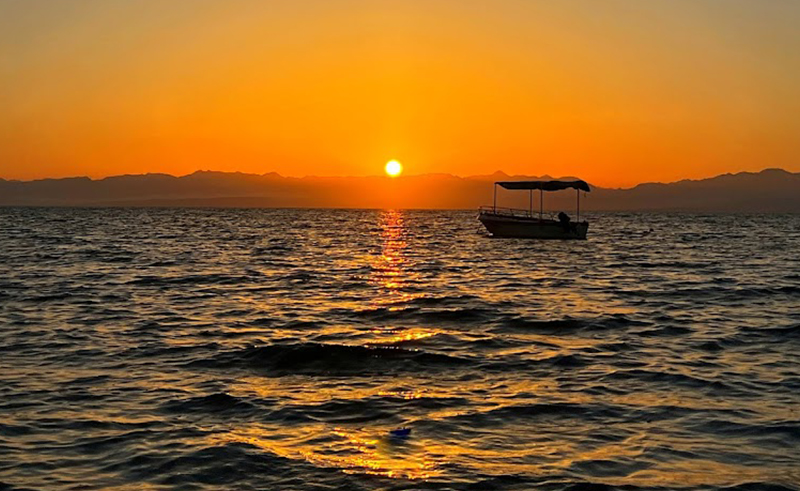
It took us about an hour and a half to reach our final campsite, Sondos—a sanctuary on a not-so-populated beach on the Red Sea. Fresh off two days of hiking in the desert, it was incredibly rewarding to be greeted with crystal blue waters. Almost instantly, everyone raced to their cabins to change into swimsuits and take a much-needed splash.
“We always try to combine hiking with other activities like swimming, yoga, group discussions, painting,” Sharif told me. “Our hope is that these fun group experiences result in friendships that last long after our trips.”
The night before we were to head back to Cairo was filled with snacking on caramelised popcorn, playing dominoes and tawla by the beach, heartfelt talks, and overindulging on mangoes, which Eman, of course, had brought along for us and had even sliced up herself.
Although I hadn’t exactly gone on this trip with much of an open mind (mainly, fear), it ended up going as smoothly as I could have ever hoped.
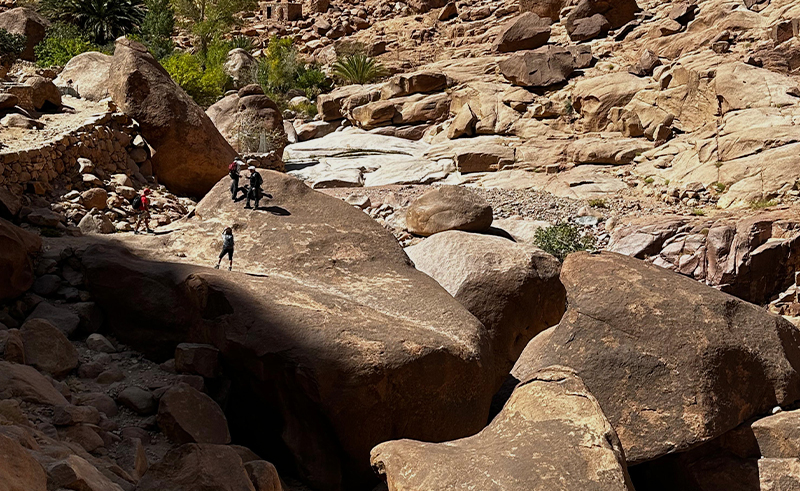
I came in thinking that hiking was all-around inaccessible in Egypt. You can’t just pack a bag and decide to go on a solo hike. It requires a lot of knowledge, research and an experienced guide. But, it turns out, there are plenty of hiking groups that can curate the experience for you.
Though, some of these organisations lack necessary education about safety precautions and often only offer “touristy” itineraries, devoid of connection to the locals or the land. Charif’s approach, on the other hand, is one that values the small details, the historical background and the local community at every step up and down the hiking trails. This is why a lot of my group members have been coming back for more.
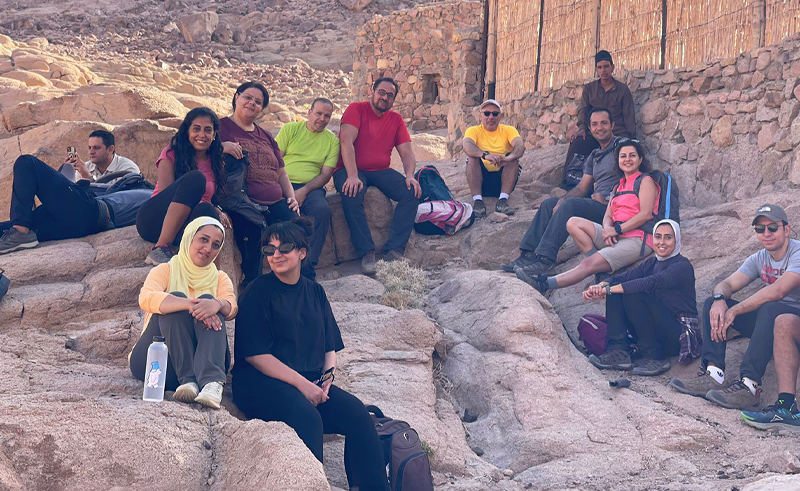
And, from what I’ve experienced on this trip (which, no matter how hard I try, I literally can’t forget), I might just do the same. Though maybe next time, I’ll join the community on a hike in Tanzania, Croatia, Romania—it doesn’t matter. Wherever I end up going, I know I’ll be reuniting with some old friends I made that one time I went hiking in the Sinai desert.
Related Articles
Trending This Week
SceneNow TV
Events Calendar





